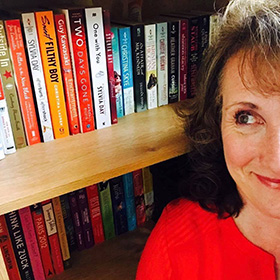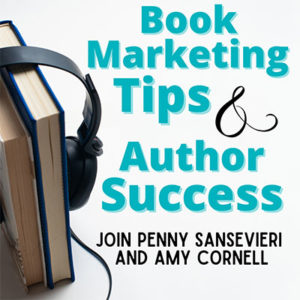People often ask me: what are the best book marketing strategies? In other words: What sells the most books?
The short answer is: No one thing sells books. It’s always a cumulative set of strategies that gets and keeps your book in front of the reader.
The best book marketing strategies help authors build a robust online presence, consistently reach a larger audience, and increase book sales.
So let’s dig into the top book marketing strategies every author should master!
And yes, I get it – that’s often easier said than done – but that’s why I dedicate so much time to this blog and our podcast!
Whether you’re a first-time author or a publishing industry veteran you still have to act strategically to reach your target audience. To keep you on track I’ve outlined the best book marketing strategies in easy-to-follow steps. By the end of this post, you’ll have a comprehensive strategy to boost your book’s exposure and maximize sales.
Step 1: Define Your Target Market
The first step in any book marketing strategy is to define your target market. Marketing without audience demographics is a waste of time and money. But it’s more than that, it’s also about finding your lane. Meaning, putting your book exactly where it belongs. When I say the term “audience demographics” that often sends a thread of fear through any author hearing or reading it. I’m not asking you to create a complicated list of demographics, not at all. It’s really much simpler than that.
When you break it down, you really just want to know more about your reader. So who are your ideal readers? What age group are they in? What are their interests? Are they tech-savvy? What other books do they read? Answering these questions will give you a better understanding of who your audience is and how to reach them.
Once you’ve identified your target market, you can begin to tailor your marketing efforts to appeal to them in really strategic and meaningful ways. For example, if your target readers are young adults, you’ll want to use different platforms and tactics than if you were targeting people 65+.
This also helps to drive decisions like: where to be online, which we’ll cover in the next bullet.
Check out this post for tips on how to build an author platform that attracts the right readers.
And be sure to download our free reader profile brainstorm, this exercise is imperative to marketing success!
Step 2: Establish an Online Presence
The next step in your book marketing strategy is to establish an online presence.
This means setting up a website, creating a social media account (or accounts), and optimizing your content for search engines.
Your website should be the hub of all your book marketing efforts. The design should be attractive, easy to navigate, and include information about your book, including a synopsis, reviews, and a call to action. You also want to make sure your website is set up for mobile too. This is particularly important for visibility on Google because mobile is no longer an option and you’ll never come up in search if your website isn’t set up for mobile. And there are a lot of options these days for setting up a website. You can hire a professional, but if this is your first book and you don’t quite have the budget for that, there are a lot of lesser expensive options like WordPress templates and Squarespace.
Finally, you’ll want to optimize your website and content for search engines. This will help your book show up in searches and lead potential readers to your site. What do I mean by “optimize”? I mean keywords and ALT tags, so the keywords associated with any images.
When it comes to social media accounts, less is more. You don’t need to be everywhere, just everywhere that matters. How do you decide where to be? Knowing your audience will go a long way to helping you determine this, but you may also want to follow similar authors. When you do this, you’ll start seeing trends in terms of social media accounts that seem to align with your readers.
Be sure to read this piece on how to garner stronger engagement on social media.
And here’s what we really think about social media advertising!
Step 3: Building a Fan Base with Email Marketing
Email marketing is another effective book marketing strategy because it involves building an email list of subscribers who are interested in your books. I like email marketing in particular because it’s a great way to reach your readers directly – without having to go through social media.
Authors can use email marketing to promote new releases, share author interviews, and offer exclusive content to subscribers. To build an email list you can use lead magnets such as free book chapters or exclusive content. Sending regular newsletters to subscribers will keep them engaged and encourage them to purchase books and leave reviews when they’re done reading. Be sure to put a newsletter sign up on your home page!
Listen to our podcast episode on maximizing your success with a newsletter.
And while you’re there, listen to our episode on the importance of author education. It’s a lot more interesting than it sounds!
Step 4: Get More Book Reviews
Book reviews are critical for book marketing because they help authors build social proof, increase book sales, and gain credibility in the book industry.
Authors can get book reviews by reaching out to book bloggers, Bookstagrammers, influencers, and of course, everyday readers. You can also reach out to your mailing list, which is why having a newsletter is so important!
Goodreads is also an excellent platform for getting book reviews. Encouraging readers to leave reviews on Amazon and other online bookstores will also help increase book sales because positive reviews help convince other shoppers to buy.
The other secret to book reviews that few people talk about is a letter in the back of your book asking for reviews. So the idea is a letter, thanking readers for taking the time to read your book and then asking for a review. Trust me, it makes all the difference. We’ve worked with authors who have gotten hundreds of reviews doing this. Make your book work for you!
Listen to this episode on how the Amazon book review process is changing for readers to ensure you keep up to date on the user experience.
And here’s how to drum up more reviews with special promotions.
Step 5: Reach out to Book Groups
Book groups are made up of readers who meet regularly to discuss books. They can be traditional book clubs, online clubs (like MeetUps!), and increasing in popularity are social media groups and pages for genre fans. They are an excellent way for authors to connect with readers, gain exposure, and promote their books.
You can find book groups by searching online or reaching out to local libraries and bookstores.
Offering book club discussion guides and author Q&A opportunities on your website will also help make your book more appealing to book groups!
And while you’re feeling creative, be sure to read this post on planning and hosting author events in non-traditional venues. They can be a lot more fun!
Plus here’s a piece we did on securing more author events across the board.
Step 4: Leverage Influencer Marketing
This one will take you a bit more time, but if you can get an influencer to mention your book, it could mean a big surge in book sales. But keep in mind that “influencer” is relative, they don’t have to be a mega-celebrity, it could be someone more specific to your reader market. If you wrote a romance novel, maybe it’s a bestselling romance author. If you wrote a book for HR professionals, or a book on home project DIY – your “influencer” is going to look different.
The goal is to see if the influencer will mention your book to their followers or share it in some other way, like a post, perhaps their newsletter if they have one, on their website, or maybe you can get a blurb or endorsement from them to use on your website or Amazon retail page.
Keep in mind that big influencers, so major recognizable names, are often costly endeavors. So if you’re going to do influencer outreach, be smart about who you really need to target.
A final tip: follow influencers before you pitch them. Spend some time networking with them – liking their posts, commenting on their posts, etc. No matter how big you get, engagement is everything so if you want to connect with an influencer, be an active participant.
Check out our ultimate guide to crafting an irresistible book pitch.
If you’re interested in getting booked on podcasts you’ll want to read this piece as well.
And don’t forget your local market, it’s amazing how much you can boost your monthly sales by getting your book in nearby retail stores by playing the “local author” angle. Here are some tips for making those connections.
Step 6: Run Amazon Advertising
While I know that social media advertising is popular, I love Amazon ads for one major reason: the Amazon site is about buying stuff, whereas social media is very distracting and you have to get someone from a social media platform to your Amazon book page, so your “offer” has to really entice a click, which is hard. Also this: moving prospective buyers from social media to your retail page isn’t easy. On average, with each click you lose 20% of your potential buyers. So that’s a consideration as well.
If Amazon ads seem daunting and expensive, it doesn’t have to be. You can set a monthly budget that you feel comfortable with. If you can’t seem to figure out to run ads on your own, reach out to me for help! Our Amazon programs are the best in the industry.
And here’s how to effectively run ads to promote a book release.
Step 7: Connect with Your Readers
This isn’t meant to be a duplicate from Step 3, but they are related.
Goodreads did a study a few years ago and discovered that the #1 thing that readers want to do when they get to the end of a book is to connect with the author. I mentioned the letter to readers earlier – it’s easy enough to add. But you can also do this in a variety of ways: with a dynamic website that gives readers a more personal look at who you are as a person, hosting Q&A sessions or live videos on social media, running regular contests and giveaways to surprise them, and responding to comments and reviews.
Goodreads is another great place to connect with readers. It’s owned by Amazon and they’re doing a lot of cross-promotion beta testing lately. Make sure your author profile is optimized and you’ve joined groups – but also be a reader and a genre fan. Don’t show up just to sell your books, show up to add something positive and make the experience even better for others!
Here’s a piece we did on how to connect with Goodreads readers to drum up more reviews.
Step 8: Participate in Events
Whether these are book signings, book fairs, or local small business events, they’re a great way to meet readers face to face and increase visibility for your book.
Yes, aim to do book events for yourself, but don’t underestimate how much you can get out of showing up to other events in your area as well. Show up to events at libraries, trivia nights at pubs, community events and markets, etc. People love meeting an author, so you can make a lot of headway with your local promotion simply by getting out there and introducing yourself (with a few business cards handy of course!).
Here’s a piece we did on promoting your book to libraries, especially if you’re self-published.
And definitely read up on how to market a book by leveraging local media. It’s an untapped resource too many authors forget about.
Believe it or not, the best book marketing options for authors usually aren’t flashy.
Over the years I’ve seen lots of “next level” ideas like buying theatre ad space before a movie, or buying a billboard on a busy highway. You name it, I’ve seen it.
But the best book marketing still comes down to a set of simple, core steps that, if overlooked, will make it harder to get your book noticed. Yes, you can do all the big, flashy things, but start with these core elements first, you’ll be glad you did.
By following these steps, and creating a solid foundation, you’ll be able to effectively and creatively market your book and maximize sales.
Resources and Free Downloads
Websites for writers: why you need a media page.
10 proven effective book promotion strategies to add to your plan.
Everything you need to know about pitching a book for film rights.
Download our free monthly book marketing planner.
Check out all the episodes of our book promotion podcast anywhere you listen to podcasts!
Be sure to sign up for our newsletter on the right-hand side of our blog homepage. If you haven’t opened a recent one your registration may have lapsed.
Definitely follow us on Instagram for book marketing tips and some much-needed levity!





The recommendations/steps provided by Penny Sansevieri are superb. My favorite is the letter at the end of the book asking readers for their review, which is a great idea. Some ideas/steps, like reaching out to reading groups and contacting an influencer, are ideas I have heard before, but finding said groups or people is like finding a needle in the haystack. I wish there were articles dedicated to how one might find these groups and how to avoid getting scammed. Influencers, in particular, seem to have a disproportionate number of scammers. Overall, it is an excellent article with good information.
I appreciate this Dak! And I agree, finding influencers that are legit can take some trial and error. I recommend reaching out to those who have a strong website presence, and don’t solely rely on social media. Yes, social media is a big piece of this, but in our experience the ones with staying power aren’t only on social. The thoughtfulness of the reviews is also important. Do they sound vague or general, or is the influencer really digging into likes and dislikes? And how often are they posting? Posting too frequently means even if you do get coverage, you’ll quickly be replaced by the next book. Now don’t get me wrong, sometimes it makes sense to just get everywhere you can, especially when you’re starting out – but you’re right to assume not all coverage is created equal.